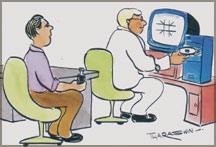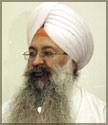|

Ethical issues in science
BY PROFESSOR PRIYANI E. Soysa Chairperson - NHRC,
Emeritus Professor of Paediatrics
THE National Health Research Council (NHRC) has functioned for many
years though some high officials have found it difficult in terms of
time to continue to serve on it. The following constitute the present
council.
* Prof. Priyani E. Soysa (Chairperson)
* Deputy Director General of Planning of the Ministry of Health
* Deputy Director General Medical Services of the Ministry of Health
* Deputy Director General of Public Health Services of the Ministry
of Health
* The Deans of many medical faculties or their representatives
* The Director of the Postgraduate Institute of Medicine (PGIM)
* The President of Sri Lanka Medical Association (SLMA)
* The Chairperson of the Nawinna Ayurvedhic Research Institute
* The Director of the Medical Research Institute
The Ministry of Health provides the Secretarial help with the Deputy
Director General of Education, Training and Research, the Director of
(Training) and associates attached to this division.

Over the years, various activities were carried out by this Council
which included Research Management Workshops and Writing Research
Proposals open to interested and nominated participants from the Medical
Faculties and the Department of Health.
A large workshop was held not only to identify research priorities
but also research policy. The latter was on the basis of a draft
prepared by a WHO expert from Nepal who spent weeks meeting experts
before submitting the draft. This was discussed by a variety of
scientists besides medical experts.
The final draft was circulated for corrections. The NHRC spent nearly
one year seeking views of the Council members. One section included the
constitution of Ethics Review as a sub-committee. This policy was
accepted by the two Cabinets, the last and the present. Many grants have
been awarded for research in Community Medicine and Microbiology.
The Council is now planning a series of public lectures to include
their participation and to increase their awareness of new issues
arising from the rapid expansion of medical technology, specially within
the last two decades. This is essential for understanding the concept of
informed consent.
Perhaps, it is particularly relevant at this time, when a host of
local and foreign agencies are using the tsunami disaster to take undue
advantage of victims with overlapping research and questionnaires.
At present there are many ethical research review committees in all
the medical faculties which have worked for many years.
NARESA too has played a role more than twice to update and discuss
the World medical Association (WMA) code which was the original guiding
document. Questions of transplantation, sex determinations and
abortions, and HIV issues are some areas under review.
In a planned series, the NHRC have organized a public seminar on May
8 (Sunday) with the collaboration of Sri Lanka Medical Association (SLMA)
and National Science Foundation (NSF) at the Lionel Memroiral
Auditorium, SLMA from 9.00 a.m. - 12 noon. Admission is free and open to
the public.
The speakers are Prof. A.H. Sheriffdeen, President SLMA on Ethics of
Transplantation, Prof. H. Seneviratne, Professor of Obstetrics and
Gynaecology of the Colombo Medical Faculty on Ethics of Assisted
Reproductive Technologies and Prof. Anoja Fernando, Senior Professor of
Pharmacology on Ethics of Research.
These presentations will be informative and directed towards
improving awareness of Public Science Culture which is sadly lacking in
the country. Here is a beginning for improving scientific education for
everyday life.
All are welcome. Ignorance is not mere bliss, it is astounding not
merely with ordinary people but among professionals. The river of
science flows on for ever, with rapids and falls. Therefore there is a
need to review progress and defaults for the good of humankind.
Medical horoscopes on the way
Very soon doctors in consultation rooms will be calling for your
Medical Horoscopes in CDS, which they call 'Genomic' to diagnose your
ailments and also predict your future in health, based on a family
health history record.
Your medical horoscope (Genomics)
Unlike an astrologer forecasting your future by reading your
horoscope, which may or may not happen as foretold. Doctors are now
researching to predicting your future accurately through what they call
your 'Genomic' record. That's your family health history record.
This emerging new trend in health is described in an article carried
in the February 2005 issue of the American Family Health Journal-FP
Report.
A copy of which has been sent to the Healthwatch for use by our
Medical Advisory Panellist Dr. Dennis J. Aloysius.
In this article titled - First 2005 ACF programme highlights family
genetic history. It states,
Annual clinical focus on genomics
"AAFPS Annual Clinical focus on genomics launched late last month
focuses on how family physicians can uncover, explore and use patients
family histories to help predict and manage health conditions that
include a genetic component.
Dr. Norman Khan explains
In this article Family Physician Norman Khan MD AAFP (Vice-President
for Science and Education) explaining why genomics was chosen for this
year's ACF initiative refers to two clinical scenarios participants are
likely to have encountered in their practices and outlines some issues
they raise.
How does family history help clinicians decide what screening
interventions are appropriate for their patients? What are the
implications of a positive or negative screening result on preventive
management?
Genetic glitches we carry around and making predictions
Dr. Francis Collins MD. PhD (Director of National Human Genomic
Research Institute) writes: "We will learn the individual genetic
glitches that each of us carries around end that will give us a chance
to make predictions about who's at risk for what?"
Acu-Magnetic Consultant on a mission to create awareness
SARATH Malalasekera talks to Dr. Rasvinder Jit
Singh
ACU-MAGNETIC treatment which dispenses an established form of
alternative therapy in which no medicines are administered are
introduced in Sri Lanka by Dr. Rasvinder Jit Singh, Chief Consultant at
Acu-Magnetic Treatment Centre, Alkhuwair, Muscat Sultanate of Oman.
|

Dr. Rasvinder Jit Singh |
Dr. Jit Singh who is also the Chairman of the International Hospital
for Natural Treatment, India is on a mission to create awareness on Acu-Magnetic
Therapy in Sri Lanka.
Dr. Jit Singh who was on a short visit to Sri Lanka on request by Dr.
M. G. M. Zulfic recently said that effective treatment by advanced Acu-Magnetic
Instruments enabled the safe successful treatment and cure of diseases
of Sexual Weakness, Asthma, Diabetes, Back pain (Disc problems), Neck
pain (Cervical problems) Headache, Migraine, Depression, Arthritis,
Joint pain, (knee, neck, shoulder, elbow, hip, ankle and heel).
This facility offers treatment free of charge to reduce stress from
body and mind. The stress reduction therapy involved the use of two
devices - a stress free card and a pyro-magnetic mattress.
The human body is composed of five elements as the environment -
water, air, fire, earth and weather.
The ratio of these elements is the same in human body and the
environment.
Nearly 90 per cent of diseases are caused by stress while 80 per cent
lead to stress, Dr. Jit Singh emphasised.
Symposium on neuro trends
A symposium on new trends in neuro sciences in Sri Lanka was recently
held at the Asiri Surgical Hospital at Narahenpita, with the
participation of a number of leading consultants in the specialities.
At this symposium the consultants gave live demonstrations of the
application of some of those latest facilities, specially with regard to
neruro sciences that are available at the Asiri Surgical Hospital.
Among the specialists and consultants who gave demonstrations were
Dr. Sunil Perera (Consultant Neuro Surgeon), Dr. Ranjani Gamage
(Consultant Neuro Physician), Dr. Fred Pereira (Consultant Neuro
Surgeon), Dr. Sudath Gunasekera (Consultant Neuro Physiologist), Prof.
Saman Gunathilaka (Consultant Neuro Physician), Dr. Jagath Wijesekera
(Consultant Neuro Physician), Dr. Natasha Peiris (Consultant Physician),
Dr. Ram Mohan (Consultant Radiologist), Ruwanki Jayasinghe (Occupational
Therapist), Dr. Rohini Ranwala (Consultant Anesthesiologist), Manish
Deshmuk (Product Specialist - Neuro Navigator), Channaka Perera (Product
Specialist-Neurology Microscope) and Karthic (Product Specialist-Video
EEG Monitoring) shared their experiences at the symposium.
At present Asiri Surgical Hospital is engaged in the treatment of a
range of neurological diseases and disorders such as surgeries for
Tumors, Haemorrhages, Aneurisms and Epilepsy.
A special unit is also available for the treatment of acute stroke,
followed by rehabilitation, while in hospital and at home. Hospital
hopes to start surgery for Parkinson's disease in the very near future.
From WHO Colombo Office:
Health aspects of tsunami WHO conference in Thailand
THE tsunami that struck on December 26 across countries of South East
Asia was one of the worst natural disasters in modern history. It caused
270,000 deaths, injured 500,000 people across several countries and left
untold numbers homeless and exposed to threats of disease outbreaks.
The conference is being convened by the World Health Organisation in
cooperation with the Ministry of Public Health of the Royal Thai
Government.
Participants will be at senior policy and expert practitioner level.
The conference will focus on the lessons learnt in the immediate health
sector response to the tsunami and during the early phase of recovery in
the broader framework of efforts undertaken by the affected countries
supported by international assistance.
To review health sector experience with response and early recovery
to determine successes and limitations. This is a 'lessons learnt'
meeting bringing together health professionals from government and civil
society to examine what was done well and what could have been done
better.
This would help strengthen national capabilities for future
preparedness and response to disasters and to seek improvements in
international systems that support national capacity development.
The conference is to be held from May 4-6, 2005.
Cheryl Pitcher from UK writes:
Heart blood pumps
THE ExtraLife Centre at the Manor Hospital in Oxford, will be one of
the most advanced centres in the world, offering terminally ill patients
the possibility of improving their lives by providing heart blood pumps
known as Left Ventricular Assist Devices (LVADs), as well as other
advanced cardiac surgery procedures.
Dr. Adrian Banning, principal cardiologist and supervisor of patient
selection and post-operative care for the Oxford study of permanent LVAD
implantation said:
"Heart failure is a huge problem in our communities. These treatments
and technologies offer new hope to patients whose lives are blighted by
fluid retention and breathlessness."
Peter Houghton with LVAD implant
Chairman of the Artificial Heart Fund (AHF) Charity, Peter Houghton
was close to death in June 2000 prior to receiving the first ever
permanent heart blood pump. Since then, Peter has lived life to the
full, he has participated in 90 mile sponsored walks, hiked in the Alps
and published two books.
In addition, he has lectured worldwide about heart blood pumps and
the quality of life they can provide to 'terminally ill' heart patients.
He is now the longest living permanent LVAD patient in the world and
will celebrate the 5th anniversary of his LVAD implant in June 2005.
Founder Director of ExtraLife Philip Peake says: "The ExtraLife
Centre will be the first of its kind in the UK so we're all very excited
about its opening.
"Not only will the Centre lead the way in both research and treatment
but it will also provide significant clinical information, giving
Britain the opportunity to push forward the boundaries of cardiac
surgery with the use of mechanical devices." |








